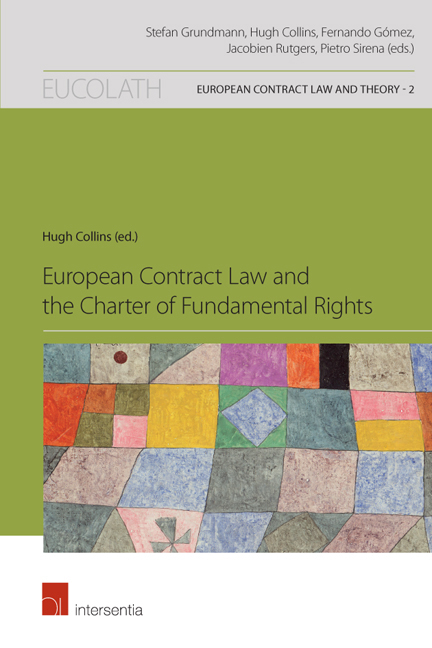Book contents
- Frontmatter
- Contents
- Table of Cases
- List of Authors
- Building European Contract Law on Charter Rights
- How Autonomous Should Private Law Be? Elements of a Private Law Constitution
- The Constitutional Transformation of Private Law Pillars through the CJEU
- Fundamental Rights before the Court of Justice of the European Union: A Social, Market-Functional or Pluralistic Paradigm?
- Minimum Harmonisation and Article 16 of the CFREU: Difficult Times Ahead for Social Legislation?
- The Right to Housing (Article 7 of the Charter) and Unfair Terms in General Conditions
- The EU Charter of Fundamental Rights and Consumer Credit: Towards Responsible Lending?
- The Justice Dimensions of the Relationship between Fundamental Rights and Private Law
- Discrimination and the Self-Employed: The Scope of Protection in an Interconnected Age
- The Effects of Fundamental Rights in Private Disputes
- Responsible Contracting: The Requirements of EU Fundamental Rights on Private Law Regimes
- Index
The Right to Housing (Article 7 of the Charter) and Unfair Terms in General Conditions
Published online by Cambridge University Press: 22 September 2018
- Frontmatter
- Contents
- Table of Cases
- List of Authors
- Building European Contract Law on Charter Rights
- How Autonomous Should Private Law Be? Elements of a Private Law Constitution
- The Constitutional Transformation of Private Law Pillars through the CJEU
- Fundamental Rights before the Court of Justice of the European Union: A Social, Market-Functional or Pluralistic Paradigm?
- Minimum Harmonisation and Article 16 of the CFREU: Difficult Times Ahead for Social Legislation?
- The Right to Housing (Article 7 of the Charter) and Unfair Terms in General Conditions
- The EU Charter of Fundamental Rights and Consumer Credit: Towards Responsible Lending?
- The Justice Dimensions of the Relationship between Fundamental Rights and Private Law
- Discrimination and the Self-Employed: The Scope of Protection in an Interconnected Age
- The Effects of Fundamental Rights in Private Disputes
- Responsible Contracting: The Requirements of EU Fundamental Rights on Private Law Regimes
- Index
Summary
‘Under EU law, the right to accommodation is a fundamental right guaranteed under Article 7 of the Charter that the referring court must take into consideration when implementing Directive 93/13.’
The Court of Justice of the European Union (CJEU) so held in Kušionová. In that case, Monica Kušionová was threatened with eviction from her home, because she had stopped paying a consumer credit of € 10,000, which was secured by a mortgage on her family home in which she lived. The mortgage agreement included a clause according to which the lender, SMART Capital, could sell the family home extra-judicially without any review by a court. Kušionová started proceedings against SMART Capital and asked for the terms of the credit agreement and the mortgage agreement to be annulled under the UTCD. At first instance, the Slovakian Court held that some of the terms in the credit were unfair as well the mortgage agreement as such and annulled them. On appeal, the Slovakian Court referred the case to the CJEU for a preliminary ruling. In its answer, the CJEU mentioned explicitly Article 7 of the Charter of Fundamental Rights, according to which someone's right to a home must be respected, holding that it must be considered while interpreting the UTCD. The wording of Article 7 of the Charter corresponds to Article 8 of the European Convention on Human Rights (ECHR); consequently, in view of Article 52(3) of the Charter, the meaning of Article 7 of the Charter will be the same as that of Article 8 of the ECHR.
This is not the first CJEU decision on unfair terms and housing. The CJEU has adopted an active role in policing unfair terms to prevent the eviction of residents from their homes during the financial crisis. In decisions prior to Kušionová, such as Aziz and Asbeek Brusse, the CJEU omitted a reference to fundamental rights and only referred to the family home as an essential need of the consumer. However, it also held that the loss of a family home cannot be repaired by providing a monetary remedy only.
- Type
- Chapter
- Information
- European Contract Law and the Charter of Fundamental Rights , pp. 125 - 138Publisher: IntersentiaPrint publication year: 2017



